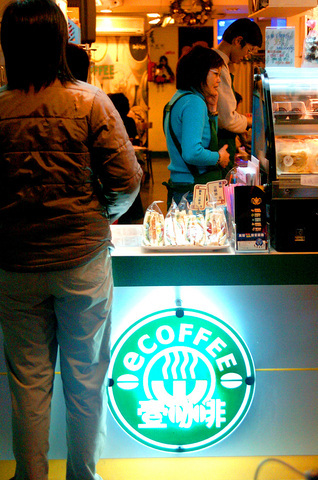President Starbucks Coffee Corp (
"The US headquarters directly commissioned its local attorney to file a complaint over E-Coffee's trademark registration, as the similarity in logos misleads consumers," President Starbucks' public relations officer Bonnie Chao (趙仁安) said yesterday.

PHOTO: SEAN CHAO, TAIPEI TIMES
The case is currently under investigation, Chao said.

PHOTO: SEAN CHAO, TAIPEI TIMES
She said that President Starbucks only found out about its US counterpart's intention to file a complaint on Thursday.
Chao said that she could not comment further, as President Starbucks does not have any involvement in the complaint.
President Starbucks, a 50-50 joint venture, has over 142 outlets across the nation, according to the coffee operator.
The US coffee giant lodged a complaint in October last year to the Intellectual Property Office (IPO) under the Ministry of Economic Affairs over E-Coffee's trademark registration, saying that the similarity would confuse consumers.
E-Coffee has not yet responded to the complaint, the IPO's section chief Chang Hui-ming (
Since the investigation is still at an early stage, the IPO may require more than a year to reach a decision, Chang said.
Starbucks in the US is reportedly also considering complaints against E-Coffee outlets in a number of other countries, including Hong Kong, China, Singapore, and Japan, where E-Coffee's trademark is registered.
E-Coffee, which has more than 280 franchised outlets, denied that its logo is misleading or infringes upon Starbucks' trademark, according to a report in the Chinese-language media citing the company's president Sam Yen (顏文山).
"We are not the only coffee store in Taiwan using a logo featuring dual circles," Yen is reported to have said.
A number of coffee chain stores, including Barista Coffee (西雅圖咖啡) and IS Coffee (伊是咖啡), use circle motifs in their logos.
E-Coffee's logo features a cup of steaming coffee, which is not at all similar to Starbucks' mermaid with curly hair, Yen said.
Yen said that E-Coffee will not settle the dispute unofficially, and does not rule out the possibility of filing a lawsuit if the IPO delivers an unfavorable ruling.

‘SWASTICAR’: Tesla CEO Elon Musk’s close association with Donald Trump has prompted opponents to brand him a ‘Nazi’ and resulted in a dramatic drop in sales Demonstrators descended on Tesla Inc dealerships across the US, and in Europe and Canada on Saturday to protest company chief Elon Musk, who has amassed extraordinary power as a top adviser to US President Donald Trump. Waving signs with messages such as “Musk is stealing our money” and “Reclaim our country,” the protests largely took place peacefully following fiery episodes of vandalism on Tesla vehicles, dealerships and other facilities in recent weeks that US officials have denounced as terrorism. Hundreds rallied on Saturday outside the Tesla dealership in Manhattan. Some blasted Musk, the world’s richest man, while others demanded the shuttering of his

ADVERSARIES: The new list includes 11 entities in China and one in Taiwan, which is a local branch of Chinese cloud computing firm Inspur Group The US added dozens of entities to a trade blacklist on Tuesday, the US Department of Commerce said, in part to disrupt Beijing’s artificial intelligence (AI) and advanced computing capabilities. The action affects 80 entities from countries including China, the United Arab Emirates and Iran, with the commerce department citing their “activities contrary to US national security and foreign policy.” Those added to the “entity list” are restricted from obtaining US items and technologies without government authorization. “We will not allow adversaries to exploit American technology to bolster their own militaries and threaten American lives,” US Secretary of Commerce Howard Lutnick said. The entities

Minister of Finance Chuang Tsui-yun (莊翠雲) yesterday told lawmakers that she “would not speculate,” but a “response plan” has been prepared in case Taiwan is targeted by US President Donald Trump’s reciprocal tariffs, which are to be announced on Wednesday next week. The Trump administration, including US Secretary of the Treasury Scott Bessent, has said that much of the proposed reciprocal tariffs would focus on the 15 countries that have the highest trade surpluses with the US. Bessent has referred to those countries as the “dirty 15,” but has not named them. Last year, Taiwan’s US$73.9 billion trade surplus with the US

Prices of gasoline and diesel products at domestic gas stations are to fall NT$0.2 and NT$0.1 per liter respectively this week, even though international crude oil prices rose last week, CPC Corp, Taiwan (台灣中油) and Formosa Petrochemical Corp (台塑石化) said yesterday. International crude oil prices continued rising last week, as the US Energy Information Administration reported a larger-than-expected drop in US commercial crude oil inventories, CPC said in a statement. Based on the company’s floating oil price formula, the cost of crude oil rose 2.38 percent last week from a week earlier, it said. News that US President Donald Trump plans a “secondary